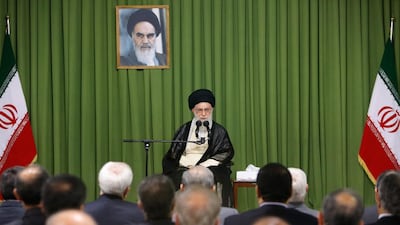In just under a week, the Iranians and the Americans say, they will present an answer to Iran’s nuclear programme. In reality, they are only likely to raise more questions.
The diplomatic wrangling over Iran’s nuclear programme has gone on for years, but in the past year there has been a concerted push by both the western powers (the so-called P5+1) and Iran, which is growing tired of sanctions. Unnamed diplomats have suggested as much as 95 per cent of the issues have already been agreed. But that 5 per cent could be unbridgeable.
Surely, then, with agreement so close and with the issue so great, it is churlish of the Gulf states to continue their displeasure at the prospect of rapprochement with Iran? After all, if the possibility of Iran acquiring nuclear weapons recedes, then Iran can no longer be a threat to the Gulf states?
This reading of the situation is, however, profoundly mistaken. Despite the conciliatory tone struck by Oman’s foreign minister in an interview last week – where he said that an agreement between Iran and the west would be more in the Gulf’s interests than in Iran’s – the mood behind the scenes in the Gulf is far from genial.
That is because Iran won’t become a threat to the Gulf by acquiring nuclear weapons. It is already a threat now.
This is not hyperbole. Over the past decade, Iran has steadily expanded its influence across the Middle East – recently with tacit US support.
The “big bang” came at the start of the century, when the United States, helpfully, destroyed two of Iran’s enemies. Subsequent reporting – particularly from The New Yorker’s Dexter Filkins – has exposed exactly how deep the relationship between the two countries was in the war against the Taliban. This was not a nod and a wink, this was open collaboration.
The same happened in Iraq, although both sides played dirty.
The Iranians both supported the Americans against Saddam Hussein and, later, his loyalists, and sought to undermine them. The murkiness of that war and the back room deals that carved out a wide sphere of influence for Iran inside Iraq has poisoned the relationship between Sunnis and Shia, perhaps for a generation.
When the Arab Spring exploded, the Iranians were swift to move in, particularly in Syria and Yemen. In the latter, although initially the Gulf-brokered agreement seemed to marginalise the Houthi rebels, consistent action by Iran has paid off: the Houthis, though small in number, have essentially gained veto power over Yemen’s government.
The GCC, occupied as it has been with events within its borders and the raging wars to its north, has neglected the government in Sanaa, with the result that Iran now wields incredible influence on the government of one of the largest countries on the Arabian Peninsula.
All of that is without even discussing Syria, where Iran’s support for the murderous Assad regime has destabilised the entire region and made millions homeless.
All of which is essential background to understand the view of the Gulf states.
A future time when a nuclear-armed Iran poses a threat across the Strait of Hormuz need never materialise: Iran is a threat now, gradually pursuing policies that reduce the security and stability of the Gulf.
It is for that reason that the Gulf states view a nuclear deal with such trepidation. In its rush to get a foreign policy victory for Barack Obama’s time in office, the US administration has ridden roughshod over decades of links. The Gulf looks to the US to guarantee security in the region: what message does it send when the Americans go behind the backs of their allies and seek a deal with Tehran?
As Hussein Ibish wrote on these pages yesterday, there is a feeling in the Gulf that the US is tacitly accepting a sphere of influence for Iran – a sphere that encircles the traditional allies of the Gulf.
If there is an agreement with Iran next week, many in the West will congratulate themselves on the power of that diplomacy and the effective use of sanctions.
But the mood in the Gulf will be less celebratory. There has never been an issue with the people of Iran, nor with its position as a majority Shia country. The problem is all politics. When the diplomats and politicians of the West have finished their gladhanding, they will leave the Middle East – but for the Gulf Arabs, the problems with the government in Tehran will continue.
falyafai@thenational.ae
Twitter: @FaisalAlYafai


